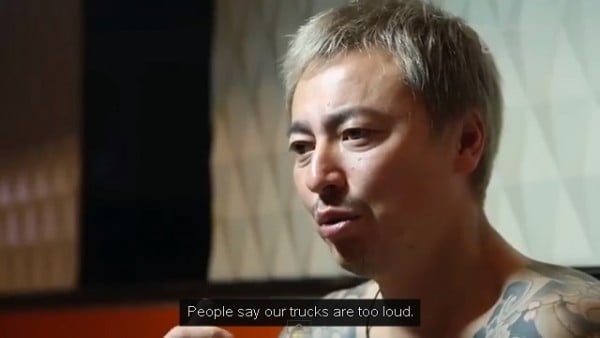
Masaya Kudo, chairman of the ultra nationalist group Nihon no Kai. (Gokudo Uyoku Connection)
Gokudo Uyoku Connection is a new series of documentaries by Sebastian Stein, director of Twilight of the Yakuza. Like his earlier film, Stein gives his audience a rare inside look into a group few foreigners (and few Japanese) ever get to see up close.
In his new series, Stein draws attention to the connection between gokudo (aka “yakuza,” Japanese mafia) and uyoku dantai, right-wing groups commonly referred to as “ultra nationalists” in English, once collectively known as “black dragon societies,” although that term has fallen out of favor (the Black Dragon Society was the name of one of the original ultra nationalist groups, now disbanded). These groups are best known to outsiders for driving around black vans blasting militaristic music or chanting right-wing slogans over loudspeakers mounted to the vans.
Once again, Stein presents his subject without commentary. He trusts his viewers to draw their own conclusions about the subject (although opinions can still be manipulated through editing, music, lighting). He interviews one Masaya Kudo, chairman of the ultra nationalist group Nihon no Kai. Kudo sits for the interviews with his shirt off, his tattoos indicating yakuza membership on full display. He is unequivocal about ultra nationalist groups’ affiliation to the yakuza. He says ultra nationalists need to pair up with the yakuza in order to operate, as they often stage their protests in a yakuza gang’s territory (be it in front of the Russian Embassy), and for yakuza protection. However, neither Stein nor Kudo mention that not every right-wing group has yakuza affiliation, although many of them do.
Kudo claims Japan’s ultranationalists are not racist like right-wing groups in other countries, such as the Nazis or Ku Klux Klan. He then goes on to claim Chinese looters were cutting fingers of the dead victims of the 2011 Tohoku earthquake/tsunami for their rings. This sounds unsubstantiated to me, and, if true, could not have been widespread as few Chinese lived in the Tohoku region. He went up to Tohoku with a small group armed with crude weapons prepared to kill any Chinese looters they should come across and bury them in the rubble. This would be very easy to get away with, according to Kudo. Luckily (and, perhaps, not surprisingly), Kudo and his gang never came across these Chinese looters, and no murders occurred.
My personal experience also makes me doubt Kudo’s claim ultranationalists aren’t racist. I remember being in Kamakura in February 2010, around the time the question of whether non-Japanese citizens should have the right to vote. The right-wingers were playing this issue up as if it was a question of every foreigner on Japanese soil should be entitled to a vote, while it was really an issue of the descendants of Koreans forcibly brought to Japan for labor, who have Japanese names, speak Japanese as a first language, and have never been to Korea, should be allowed to vote, even though they’re not citizens. The ultra nationalist, standing atop a black van outside Kamakura Station, an area that attracts a lot of tourists due to its historic Buddha statue, said, “Given the right to vote, foreigners would make stupid decisions. Case in point: Americans democratically elected Barack Obama president.”
While I certainly don’t agree with ultranationalists’ message or their tactics, I do understand their appeal. Even moderate Japanese feel like the U.S. is too involved in Japan’s foreign policy. They feel the Japanese leaders acquiesce to U.S. demands, even the ones that are detrimental to Japanese interests, for the sole purpose of maintaining the status quo. Many wish their leaders were more assertive. This may explain how men like Toru Hashimoto and Shintaro Ishihara continue to be elected, even though the majority of Japanese don’t share their views.
Throughout Stein’s documentary, we the viewers get to ride alongside Kudo as his group’s sound van drive around the Russian Embassy, demanding the return of the Northern Territories to Japan. They have run-ins with police, and generally carry themselves with typical yakuza swagger. One amusing scene involves Kudo having dinner with several other nationalists and they lament the disinterest young people have in their organization. They brainstorm ways to use the Internet and social media to reach out to young people.
My one criticism of the documentary is Kudo is the only person interviewed. I would have liked interviews with police, politicians and other nationalists as well. However, as this was a short documentary (21 minutes), and it is the first part of a series, this isn’t a huge complaint. But I do hope Stein branches out more with future installments.
I highly recommend this documentary as it is very well made and provides relevant insight on a small group with disproportionate power in Japanese politics. The first part of the series can be viewed on YouTube: http://www.youtube.com/watch?v=Adze5L8xFzU&feature=c4-overview-vl&list=PLyheH-sHmeaO8LrHVJXJlvtCBNEjYtolf